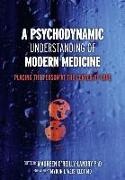Read more
Science and technology have brought about profound changes in the way medicine is practiced. These developments save more lives, but can have a negative impact on psyches and relationships. Thoroughly examining the way medicine is practiced in the 21st century, this ground-breaking new book emphases the interpersonal, subjective and unconscious processes. It provides important and useful insights into the many ways patients, families and medical practitioners are affected by modern medicine. A Psychodynamic Understanding of Modern Medicine offers profound ways to understand these issues in all their complexity and depth, and demonstrates ways to effectively manage difficulties by drawing on psychoanalytic principles. In so doing, the book directly addresses topics rarely covered from a psychological perspective, such as organ donation, assisted suicide requests, impaired mobility, assisted reproduction, elder abuse, placebos, dialysis units, NICU, general hospital setting, provider-patient relationship and family dynamics with chronic illness. The book is highly recommended to to all who involved with modern medicine. Medical practitioners will have a better means of understanding psychological and interpersonal problems that present themselves in various medical settings. Psychologists and psychiatrists will be more able to intervene when problems occur, including when they involve the interaction between practitioner and patient or family. It is also illuminating reading for students with an interest in medical anthropology, and social and narrative medicine. Zusammenfassung Science and technology have brought about profound changes in the way medicine is practiced. These developments save more lives, but can have a negative impact on psyches and relationships. Thoroughly examining the way medicine is practised in the 21st century, this ground-breaking new book emphasizes the interpersonal, subjective and unconscious processes. It provides important and useful insights into the many ways patients, families and medical practitioners are affected by modern medicine. A Psychodynamic Understanding of Modern Medicine offers profound ways to understand these issues in all their complexity and depth, and demonstrates ways to effectively manage difficulties by drawing on psychoanalytic principles. In so doing, the book directly addresses topics rarely covered from a psychological perspective, such as organ donation, assisted suicide requests, impaired mobility, assisted reproduction, elder abuse, placebos, dialysis units, NICU, general hospital setting, provider-patient relationship and family dynamics with chronic illness. The book is highly recommended to all who are involved with modern medicine. Medical practitioners will have a better means of understanding psychological and interpersonal problems that present themselves in various medical settings. Psychologists and psychiatrists will be more able to intervene when problems occur, including when they involve the interaction between practitioner and patient or family. It is also illuminating reading for students with an interest in medical anthropology, and social and narrative medicine, and for nurses and medical social workers. Inhaltsverzeichnis Foreword. Preface. About the author. Contributors. Section I: Introduction. The interpersonal and psychological dimensions of modern medicine. Contemporary psychodynamic concepts and modern medicine. Section II: Subjectivity! personal meaning and the medical experience. Creating security by exploring the meaning of illness in adolescent patients. Mobility matters: the intrapsychic and interpersonal dimension of walking. When the body fails: living with a chronic illness. Managing dental patients with oro-facial pain: psychodynamic explorations. T...

